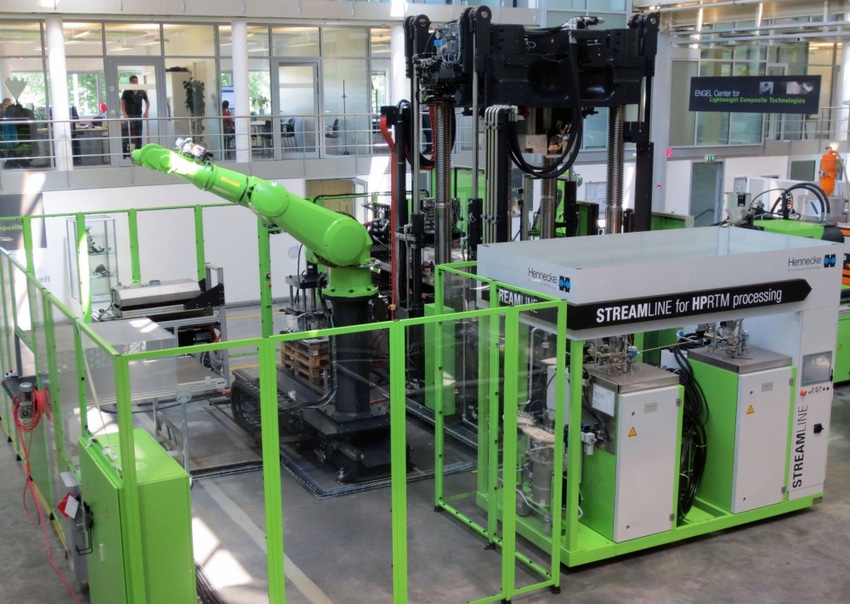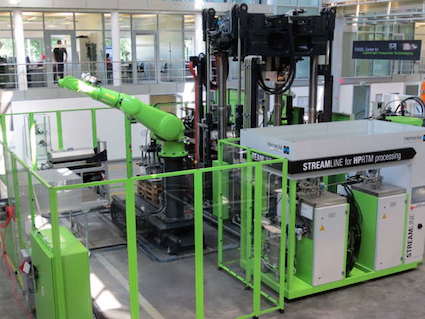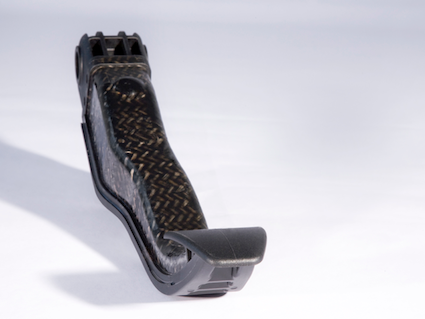Engel to debut processing expertise at Composites Europe 2014
Injection machine builder Engel (Schwertberg, Austria) is presenting its expertise in lightweight composite technologies at the Composites Europe trade fair, which takes place from 7th to 9th October in Düsseldorf, Germany. At Engel's center for lightweight composite technologies, the company co-operates with partner enterprises on developing economical processes for serial production of innovative carbon fiber-reinforced plastic (CFRP) components.
September 10, 2014

Injection machine builder Engel (Schwertberg, Austria) is presenting its expertise in lightweight composite technologies at the Composites Europe trade fair, which takes place from 7th to 9th October in Düsseldorf, Germany. At Engel's center for lightweight composite technologies, the company co-operates with partner enterprises on developing economical processes for serial production of innovative carbon fiber-reinforced plastic (CFRP) components.
Lightweight construction and injection molding have long become inseparable key concepts for meeting increasing mobility demands according to Engel. "Integrated plastics solutions contribute towards reducing vehicle weight, while at the same time empowering economical processes for high-volume serial production," it says.
 At the Engel Center for Lightweight Composite Technologies in St. Valentin, Austria, various production cells are available for joint research projects, mold trials and contract work. All the machines have been tailored to the demands of manufacturing fibre-reinforced plastic components.
At the Engel Center for Lightweight Composite Technologies in St. Valentin, Austria, various production cells are available for joint research projects, mold trials and contract work. All the machines have been tailored to the demands of manufacturing fibre-reinforced plastic components.  In designing the brake pedal, the layer structure in the thermoplastic fabric was modified to handle the load.The objective of the Engel Austria Center for Lightweight Composite Technologies, founded in 2012 in St. Valentin, Austria, is to accelerate the development and market launch of new manufacturing processes. With its high levels of system solution and automation expertise, Engel already offers one success factor that is crucial for this. Engel's understanding of the Technology Centre is above all that of a platform for interdisciplinary collaboration with partner enterprises and universities. "One important precondition for successful CFRP projects is that the materials, design and production process mesh in the best possible way. This can only work if enterprises bundle their expertise along the value chain. Composite engineering needs 'composite' development", says Peter Egger, Director of the Engel Center for Lightweight Composite Technologies.
In designing the brake pedal, the layer structure in the thermoplastic fabric was modified to handle the load.The objective of the Engel Austria Center for Lightweight Composite Technologies, founded in 2012 in St. Valentin, Austria, is to accelerate the development and market launch of new manufacturing processes. With its high levels of system solution and automation expertise, Engel already offers one success factor that is crucial for this. Engel's understanding of the Technology Centre is above all that of a platform for interdisciplinary collaboration with partner enterprises and universities. "One important precondition for successful CFRP projects is that the materials, design and production process mesh in the best possible way. This can only work if enterprises bundle their expertise along the value chain. Composite engineering needs 'composite' development", says Peter Egger, Director of the Engel Center for Lightweight Composite Technologies.
The Technology Centre's current focus is on processing semi-finished thermoplastic products (thermoplastic fabrics and tapes), and on reactive technologies that use thermosets and thermoplastic systems, such as HP-RTM and in-situ caprolactam polymerisation. With sample parts, presentations and videos, Engel will be giving trade fair visitors a peek behind the scenes into ongoing research work, and successful customer projects.
Tailor-made machines for BMW
The BMW i3 is probably the best-known electric vehicle on the market right now. Its shell components are manufactured on Engel duo injection molding machines. Two large-scale Engel duo machines with a clamping force of 40,000 kN are integrated as a twinned system. In master/slave mode, both machines can be synchronised to injection mold and complete two components at the same time. This manufacturing principle ensures that both components undergo exactly the same material aging process and the high quality requirements are met. Parts are handled by multiple axis robots, which Engel integrates into the production solution as the general contractor. Engel's most recent delivery to the BMW plant in Leipzig was in March this year.
Vertical injection machine with reduced footprint
In the summer of 2014, the BMW plant in Landshut also commissioned a new Engel production cell. On an Engel v-duo vertical machine, the plant manufactures large-scale, structural, fibre-plastic composite components using the HP-RTM process. BMW is one of the earliest adopters of the new Engel v-duo series, which was specifically designed for fibre composite applications. The Engel v-duo enables very compact production cells with comparatively low investment costs. The machines are far more compact than the presses traditionally used for fibre composite applications. Additionally, the machine weight is significantly lower, which reduces the foundation building overhead. Because the Engel v-duo completely does without hydraulic accumulators and instead already comes with the Engel ecodrive servo-hydraulic system as a factory standard, it also sets new standards in terms of energy efficiency for large-scale machines.
Composite brake pedal now in production
At the K trade fair 2013, Engel collaborated with ZF Friedrichshafen to set an important milestone in lightweight design by manufacturing composite brake pedals, which are now entering series production. Using the Engel organomelt process, thermoplastic fabrics are heated, preformed in the mold, and immediately overmolded with polyamide resin. The production cell that Engel exhibited at K included a vertical Engel insert injection molding machine, an Engel easix multiple axis robot and an infrared oven for heating the infinite fiber-reinforced, semi-finished products.
In designing the brake pedal, the layer structure in the thermoplastic fabric was modified to handle the load. This reportedly enabled the component weight to be reduced by around 30 percent compared to conventional steel brake pedals without impairing component properties. Moreover, the lightweight construction method renders many manufacturing process steps obsolete, which increases productivity and cuts unit costs.
About the Author(s)
You May Also Like


